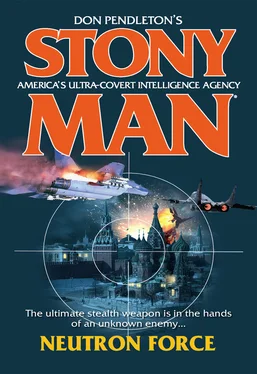“Over how long a period?” the professor asked.
“Ever.”
“No problem,” Wethers replied, his hands moving across the keyboard.
“Akira, get me his DNA and run a match on the remains in the morgue,” Price directed. “Himar might not really be dead.”
“On it,” Tokaido replied, both hands busy.
“A duplicate?” Brognola asked in concern, coming closer. “You think that a Nobel Prize-wining physicist could be a traitor?”
“Let’s see if we can find him and ask,” Price stated roughly.
“Bear, how long will it take you to breech the firewall at the Department of Defense?”
“To get files on Himar, and—Prometheus? Is that what the President said?” the burly man asked. His monitor gave a beep. “They’re just downloading now.” The man scanned the scrolling images. “Okay, Himar has a home in Braintree, Massachusetts, but his DOD lab is on Wake Island. His research, code-named Prometheus, is based there.”
The other side of the world. Price nodded. It was a smart move to keep his private and professional life as separated as possible.
“Wake Island,” Brognola mused. “Isn’t that an old missile testing range in the South Pacific?”
“North Pacific. Guess Himar wanted the laboratory isolated and far away from civilization in case something went wrong.”
“Or else he wanted privacy,” Price retorted. “All right, send Able Team to his house for any private files or papers. Phoenix Force will recon the lab. Send the details to Jack Grimaldi, and have Homeland Security tell the ground crew at Dulles to start warming up a Hercules and a Learjet.”
Braintree was close enough for Able Team to use the Hercules so that they could arrive with their equipment van. But Phoenix Force had a long way to travel to reach Wake Island. The tiny landmass was so far away that it was only technically part of the United States.
“And remind our guys to be doubly careful,” Brognola told her. “The only way to survive a neutron beam is to not get hit.” With any luck, NORAD would locate the enemy satellite and the USAF would blow it out of the sky before a major city was destroyed. However, the top cop had a bad feeling in his gut that time was short, and that this was going to get real bloody, real fast.
Calais, France
An unseen dawn arrived above the small coastal town. The overcast sky was dark with storm clouds and a torrential rain mercilessly pounded the sprawling array of homes, shops and hotels.
In spite of the early hour, the night’s festivities were still going strong in Calais, the numerous hotels filled with drunken, happy tourists. Lining the old town’s refurbished waterfront, hundreds of expensive yachts were moored at their slips against the inclement weather, and several cruise liners dominated the brightly illuminated public docks. Nearby restaurants were alive with colored lights and pulsating music. Old men and young women were laughing and singing, and the smiling waiters served a nonstop flow of steaming dishes from the kitchens to the tourists.
But on the outskirts of the city, the drab fishing docks were filled with a different kind of excitement. There was no singing or dancing, but hearts were light as calloused hands moved ropes and nets, preparing for the day’s hard work. The deep water report had just arrived and the sea bass were running.
Shouting orders, big men in yellow slickers moved around the sodden dock and trawlers, hauling ropes and nets. Powerful engines sputtered into life among the ranks of squat vessels, the dull exhaust pipes throwing out great clouds of rank diesel smoke. A bell clanged from the church tower in town, announcing the time. A man cursed; thunder rumbled. Somewhere a dog barked and oddly went silent. But nobody paid the incident any attention. Fishing was more than their business, it was their calling, the blood in their veins, and Frenchmen knew that the sea bass didn’t care if it was raining or if there were tourists in town spending money as if it was the end of the world. The fish followed the deep water currents and the fisherman followed the fish. Nothing else mattered. Unless there was a hurricane blowing, the fleet went out.
Chains rattled as heavy anchors were hoisted. Radar swept the storm from a hundred ships trying to map the roiling clouds above the choppy waves. Trucks arrived from town delivering ice to the poorer vessels, while the others started refrigerators in their holds, making everything ready for the day’s catch.
As the ice trucks pulled away from the docks, five large men appeared like ghosts from out of the torrential rain. Their boots thudded heavily on the damp planks, and the men appeared to be slightly hunchbacked in their black overcoats. The wide brims of their slouch hats drooped slightly from the unrelenting downpour, efficiently keeping the rain from their hard eyes, and also masking their features from the busy crowd of hardworking fishermen.
Marching in an almost military-like manner, the group of strangers moved past the trawlers until they reached the end of the dock. Moored at her usual place, a brand-new catamaran, the Souris, was rocking slightly from the force of the storm, her crew shouting through cupped hands at one another as they tried to be heard above the motors and thunder.
Lightning flashed in the sky as the five men climbed on board the fishing trawler without a hail, or even the common decency to ask permission. This was a major breech of nautical etiquette anywhere in the world, and a fighting offense in most French dockyards. Nobody but a fool, or a lunatic, ever did it twice.
As the deck rose and fell to the rhythm of the waves, two of the strangers stayed near the open gate of the gunwale, while the others labored to extend the corrugated steel gangplank to the dock. They moved awkwardly, as if unsure of exactly what to do, but it only took a minute before the task was accomplished.
Pulling a cell phone from his coat pocket, one of the men hit a speed-dial button and spoke briefly. Immediately, there came a soft beeping from the land and a big Volvo van began driving backward along the wooden dock, the boards creaking slightly from the unaccustomed weight.
Startled by its arrival, the angry fishermen scrambled out of the way of the vehicle, vehemently cursing with their gloved hands as only the French can do really well.
As the beeping van rolled onto the gangplank, the strangers opened the rear doors and exposed a large canvas-wrapped object strapped tightly to a bright orange shipping pallet. The rest of the interior of the vehicle was filled with loose blankets and foam to cushion the bulky cargo.
On board the Souris, a young crewman raced up the exposed stairs to the bridge.
“Skipper, we have guests!” he exclaimed breathlessly.
Smoking a briarwood pipe, the captain didn’t look up from studying a chart of the ocean currents. “Guests?” he muttered around the worn stem. “What the devil are you talking about, lad?”
“Them!” the lad declared, pointing down at the middeck.
“Them who?” the captain demanded, leaving the chart to stride over to the aft window of the bridge.
The front windows were equipped with wiperblades, but the rear weren’t, and the captain squinted through the rain. Dimly, he could see people moving around. “Did we order anything?” he demanded suspiciously. “Extra ice, perhaps? In case the refrigeration unit breaks again?” The refrigeration unit was almost older than the trawler.
“No, sir,” the lad replied, catching his breath. “Nothing out of the ordinary.”
“Strange,” the captain mumbled. “Maybe they have the wrong ship.”
“I tried to ask who they were, Skipper…” the lad began.
Читать дальше












